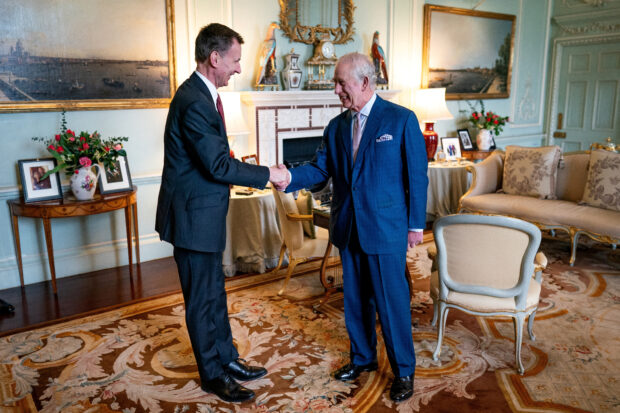Unwell King Charles absent, but still very much in the picture

FILE PHOTO: Britain’s King Charles meets with Chancellor of the Exchequer Jeremy Hunt in the private audience room at Buckingham Palace, in London, Britain, March 5, 2024. Aaron Chown/Pool via REUTERS/File Photo
LONDON — Britain’s King Charles will miss on Monday the first major royal event since his cancer diagnosis, but there is no sign of the monarch vanishing from public view let alone contemplating stepping down from his role, experts say.
Charles, 75, has been forced to postpone all public engagements since Buckingham Palace revealed just over a month ago he was to undergo treatment for an unspecified form of cancer.
The news shocked the nation coming less than 18 months after he became king on the death of his mother in September 2022 following her 70-year reign.
His absence will be keenly felt on Monday when he misses events to celebrate the Commonwealth, a club of 56 countries which evolved out of the British Empire.
Commonwealth Day, which sees senior royals attend a service at London’s Westminster Abbey where he was crowned last year, is an important annual fixture in the royal calendar as Charles heads the organisation which was very dear to his mother.
Article continues after this advertisementStill working
Article continues after this advertisementAlthough he will not be there in person, with his wife Queen Camilla leading the way instead, Charles will deliver a video message, the latest demonstration of how he is still carrying out his official state duties.
Since his illness was disclosed, he has been shown hosting Prime Minister Rishi Sunak for their regular meeting, and in the last week was pictured greeting foreign dignitaries and on a video call with Canadian Prime Minister Justin Trudeau.
“We’re in a sort of similar situation, rather, to the one the queen was in at the start of the COVID pandemic, where she was trying to juggle her duties as monarch while being detached from the public,” said royal commentator and Charles biographer Robert Hardman.
“And that’s really the model. We’ll see plenty of the king. We’ll hear from him, but it’ll just be by remote video conferencing rather than in the flesh.”
Where Charles has broken with usual royal protocol though, is in his willingness to give some insight into his health, an indication of his desire for a more open, less formal monarchy, commentators say.
Prior to the cancer news, he had also disclosed he would undergo a “corrective procedure” in hospital for an enlarged prostate, a benign condition common among men over 50.
“I think it does mark a departure from the tone in the style of his mother, the late queen,” said Anna Whitelock, professor of the History of Monarchy at London’s City University.
“On some level, he had to say something. But of course, he didn’t have to disclose that it was actually a cancer diagnosis.”
Britain’s royals usually do not disclose details of illnesses, regarding all medical issues as private, and little was said about a condition which kept the late queen from public duties towards the end of her reign.
Charles, on the other hand, had been keen to share details of his prostate treatment to encourage other men experiencing symptoms to have a medical check, aides said.
However, there is one issue on which experts are agreed: Charles will follow his mother’s example and reject the idea of stepping down as king in favour of his son, Prince William.
Abdication is not uncommon among other European monarchies – Queen Margrethe II of Denmark handed over the throne to her son King Frederik X in January after a 52-year reign – but no one expects Charles to follow suit.
“There’s no question of an abdication,” said Hardman, while Whitelock said Charles would want to protect William and his three children from being in the limelight for as long as possible.
“He wants to rule till his death. He’s waited for this role. I’m sure he’s had big, big ideas in mind, things he wants to do as king,” said Stephanie Petit, royal editor of U.S. magazine People. “And for this to just come so soon after he has started his reign must be devastating for him.”